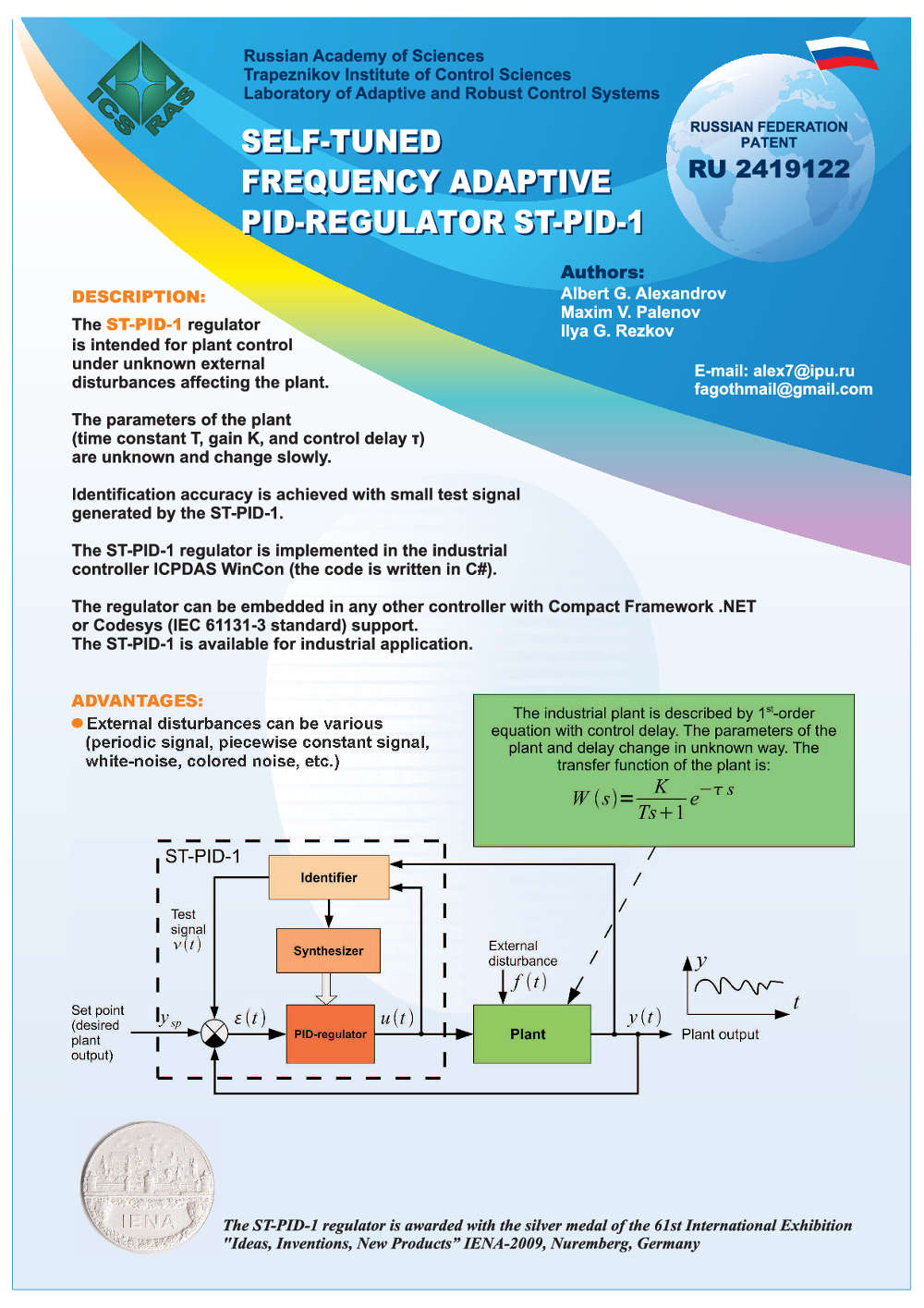Adaptive PID-I controller
General information

Problem to be resolved by the controller
Industrial digital controllers are used to control complex dynamic plants (processes) in different real-life applications such as power engineering systems, natural gas and petroleum industry, nuclear technology etc. Each controller operates in accordance with some control algorithm, which is depended on control objectives, properties and parameters of the plant, system uncertainties and external disturbances. The control algorithm is realized in some programming language (C, ST, etc) supported by concrete electronic device(embedded system). The only special software allows the embedded system became the status of control device (controller). That is why the term controller is closely related to the software that implements some control algorithm into the embedded system. For example, the programmed embedded system that realize the Proportional–Integral–Derivative(PID) control algorithm is called PID-controller. The main performance index of the control system is declination (control error) of the plant output from the reference signal, for instance, reference temperature of heating system or reference generator voltage. So, in real-life systems control errors imply heat and electric losses. The control system parameters and dynamic properties of the plant vary with time due to changing of the operating modes. This implies large control errors. Therefore self-tuning control algorithms adaptive to changes of control system parameters need to be developed. Adaptive PID-controllers is used for plants with time delay. However, if the plant operation regime changed then the controller is unworkable and the system may be unstable. In that case, the controller is switched off and tuned for “new” plant. It causes large control errors during adaptation process. The problem to be solved by proposed adaptive PID-I-controller: increasing of control errors while controller is tuned that allows to decrease the losses of warm, electrical energy and etc. during control process.
Innovation core
The adaptation process is based on plant identification and control synthesis. Identification of the plant parameters is complicated by variations of external loads (for example, fluctuations of ambient temperature of heating system or changing of power consumers), which are called by exogenous disturbances. These operation conditions require special control and identification algorithms. The proposed adaptive controllers are based on the new plant parameters identification method (finite-frequency identification) . The method uses harmonic test signal to reduce the influence of external disturbances on the identification result. The amplitude and the frequency of the test signal are self-tuned in such way that guarantees small variations of the plant output. To reduce control errors we use following algorithm. If the plant operation mode changed and we identify unstable behavior of the system then PID-controller is replaced with I-controller. The plant closed by I-controller is identified, then PID-controller is synthesized for current operation mode of the plant and I-controller is replaced with new PID-controller. Here we use the fact that, in compare with PID-controller, I-controller allows to keep system stability for wider range of plant parameters.
Advantages
The proposed PID-I controller excels all existed solutions, since it provides high-precision adaptation of the PID-controller to slow variations of plant parameters even in the case of large exogenous disturbances. The existed adaptive control algorithms realized in up-to-date controllers does not guarantees adaptation under such conditions. PID-I controller differs from other known controller in that it uses identifier that can identify a plant in the presence of unknown external disturbance. The method uses harmonic test signal to reduce the influence of external disturbances on the identification result. The amplitude and the frequency of the test signal are self-tuned in such way that guarantees small variations of the plant output. The result of identification is used for controller synthesis. If the coefficients of the plant changed then adaptation process is repeated. Identification of the plant is executed in closed-loop system. This method gives PID-controller that excels all analogous. PID-I controller is a PID-controller of new generation. It has the following advantages: а) it does not require involving engineers to the tuning process; b) it detects automatically change of the operating mode and initiates the tuning for a new mode; c) tuning process works properly in the case of external disturbances and uncertainties. As a possible analog of the ST-PID-1 controller can be considered the adaptive controller embedded to SCADA system TRACE MODE. In contrast to ST-PID-1 the referred controller does not guarantee the stability of the control system in the cases of large variations of parameters and intensive external disturbances.